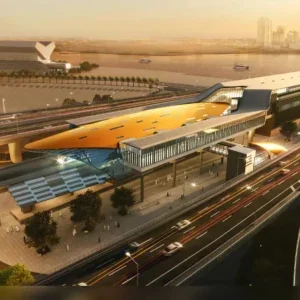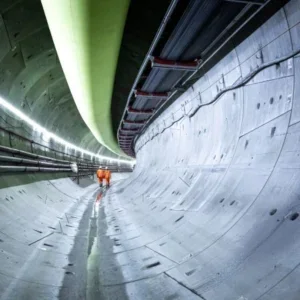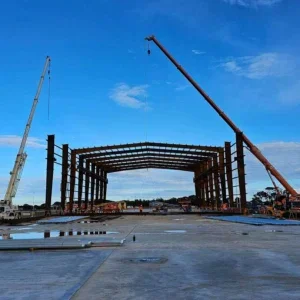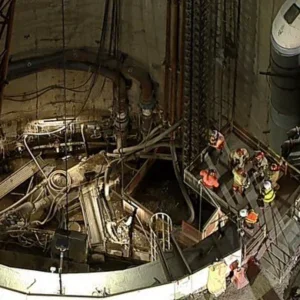As earth pressure balance tunnelling machine Liva completes her twelfth breakthrough into one of the vast pre dug underground station boxes beneath the streets of Copenhagen, world record drive rates are being claimed this month by the British led contracting team providing the Danish capital with its new DKK 6000M metro system.
Along with her twin, Betty – both named after local music hall stars – the two DKK 50M full facers remain on programme to complete all the metro’s 16.6km of tunnelling by early next month.
Behind them now lies a three year battle through difficult ground to link up the network’s half dozen average 60m long station excavations and nine deep shafts used for both ventilation and construction access.
The 25m deep cover and cut station boxes were excavated through city centre streets, with secant piled cofferdam walls often barely a metre from 250-year-old timber piled buildings.
A slow tunnelling start, through ground conditions varying from limestone containing broad bands of flint to abrasive glacial sands riddled with large boulders, led to both machines being strengthened and their heads, each with 40 cutter discs, being modified. But more recent full faces of limestone have led to weekly drive rates of up to 248m of completed 5.2m diameter concrete lined running tunnel.
This is claimed as a world record for this type of machine by Comet, the multinational contracting JV led by British contractor Carillion.
The six-strong group also includes UK geotechnical specialist Bachy Soletanche, Austria’s Strabag, French contractor SAE, Italy’s Astaldi and local contractor NCC Denmark.
The identical EPBM’s, supplied by French manufacturer NFM, came with the flexibility of operating in both open or closed head mode. The hope was to drive in closed mode through the softer glacial deposits and open up the head when routed through the underlying limestone. But this depended on rock strength and consistency plus ground water flow.
In practice all drives needed a closed head pressurised up to 3.5 bar. Foam was injected through the forward cutter head to mix with the spoil allowing it to flow more easily.
Strict environmental controls above and below ground have led to fume free tunnel locomotives; spoil being barged from the nearby harbour direct to offshore reclamation and surface piling plant muffled to limit noise.
First city centre phase of the overall 13km two route metro is planned to open next Autumn.







